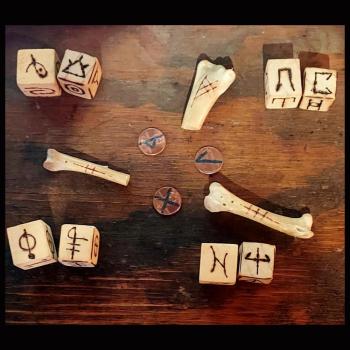In the second chapter of his new book, A Fellowship of Differents, theologian and New Testament scholar Scot McKnight likens God's design for the church to a salad bowl. "The earliest Christian churches," he notes, "were made up of folks from all over the social map, but they formed a fellowship of 'different tastes,' a mixed salad of the best kind." For instance, he contends, a house church from the apostle Paul's day would have most likely been composed of a mix of a craftworker/homeowner and his family, a couple of slaves from the town, a couple of homeless people, and a few migrant workers.
Does it sound a little different from the majority of American churches today? McKnight acknowledges we've strayed a long way from the church as Paul envisioned it, and hopes to make amends with his latest book.
As part of the Patheos Book Club on A Fellowship of Differents, McKnight answered some questions for us on the purpose of the church for the Christian life and what's at stake when we become a church of "sames" versus "differents."
How did you choose the Church as the focus for your new book?
Three convictions led to the focus on the church in A Fellowship of Differents: First, my study of the apostle Paul led me constantly to see his mission was not simply to get "Gentiles saved" but to get "saved Gentiles" into fellowship at the table with "saved Jews." Paul's mission then was forming churches.
Second, I'm disappointed with many leaders at the criticisms leveled at the church today by so many -- sometimes justified, sometimes a bit of piling on an easy target.
Third, Jesus came to establish the church, the Body of Christ, and this church -- hardly perfect and probably entirely good that it is not perfect! -- is to be God's message to the world that the kingdom of God is now alive and at work in the world.
How was the early Christian church different than the church of today?
 Probably no different at all! That might surprise some but I find no evidence the church was flourishing in holiness, glorious in love, and embodying a reconciled community of peace and justice in the early church period -- any more than the same are seen in our churches today.
Probably no different at all! That might surprise some but I find no evidence the church was flourishing in holiness, glorious in love, and embodying a reconciled community of peace and justice in the early church period -- any more than the same are seen in our churches today.
One of my themes in writing and speaking is that the church is messy and complex. It is the "now but not yet" manifestation of God's kingdom but it is not the ideal, the utopian, or the perfected people of God. The 1st-century church, if one reads briskly through 1 Corinthians or 1-2 Thessalonians, or Galatians, or Colossians -- dare I need to list any more? -- the 1st-century church was a splendid mixture of goodness and badness and that is why that church preached grace and forgiveness and growth in love and holiness.
You say the apostle Paul's vision for the early church is extremely relevant for us today. How so?
The focus of my book is that the church -- by God's focused design -- is to be not a fellowship of the likeminded and the sames but a fellowship of differents and differences. That mirrors the reality of diversity in our world, and what the church was designed to be was to bring together people who had never been together in one fellowship: Jews with Gentiles, slave with free, and men with women.
We need this because, in spite of this magnificent New Testament vision, the church continues to pattern itself after the world and culture and society: with the haves spending time with the haves, and the havenots with the havenots, Presbyterians with Presbyterians. The church mirrors the divisiveness of society more than its diversity, and so this book calls us to beat the systemic division of our culture by forming a whole new kind of people, the church of differents.
You liken God's vision for the church to a salad bowl, and elsewhere, a mosh pit. We're supposed to be all mixed up and dancing together as Church?
Yes, exactly. Remember Paul's vision: not just to get Gentiles into the family of God but to bring together people groups, economic classes, statuses, and gendered differences into one fellowship experiencing reconciliation with God and with one another.
Let me reduce this: the healthiest church is the one that brings together its entire community before God. Not in separate spaces but in one space witnessing to the grace of God's inclusive vision.
What's at stake for Christians when Sunday mornings are more of an exercise in cultural and spiritual segregation than a "fellowship of differents"?
We become the world that we are called to redeem. We have in this sense become so "relevant" that we are irrelevant because we have nothing distinct to offer to the world. What's at stake is not so much our prophetic stance but our witness to what God is doing in the world in Christ: healing the breaks between peoples.





